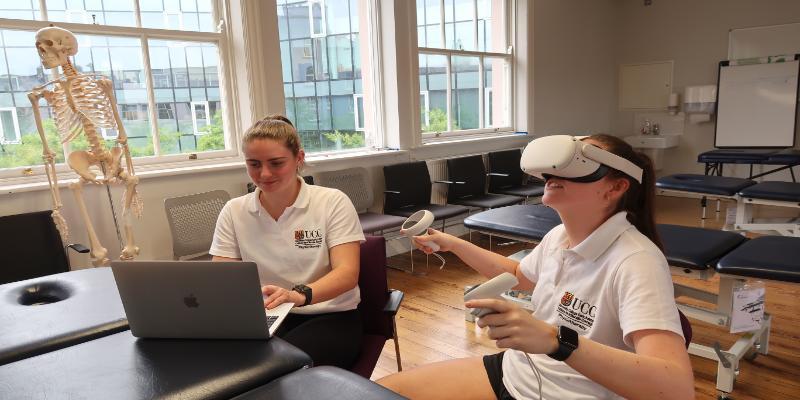News
Scale-Up4Rehab: Important step forward in digitalization rehabilitation sector

To ensure equal access to rehabilitation care and promote the resilience of health systems across Northwest Europe, a new 5-year project is being launched.
This semester saw the launch of the Scale-Up4Rehab project which represents a major advance in the digitalization of rehabilitation across Europe. Dr Joseph McVeigh, Head of Discipline of Physiotherapy and Mr David Murphy from School of Computer Science & Information Technology at UCC were partners in a successful Interreg North-West Europe (NWE) grant with a total budget of €10.8 million across 13 European partners. The Scale-Up4Rehab project aims to develop an open NWE virtual rehabilitation ‘clinic’ similar in design to platforms such as Netflix, through which existing virtual rehabilitation therapies will be piloted and scaled-up. The goal is to provide a platform that offers access to virtual rehabilitation therapies for those in need.
Access to rehabilitation services is hampered by long waiting lists and poor access, particularly in rural areas. However, the response of healthcare services to the Covid-19 pandemic has demonstrated some of the opportunities digital solutions offer in terms of access, efficiency and effectiveness. In recent years, different forms of digital rehabilitation therapy have been developed and tested with patients. Only recently the FDA in the USA approved a home-use virtual reality intervention to help those with chronic low back pain. Digital rehabilitation, harnessing the latest virtual and augmented reality technology offers access to dedicated rehabilitation care regardless of the location of a patient.
Dr. McVeigh, stated “early access to rehabilitation services is critical for good patient outcomes. Unfortunately waiting times across a host of rehabilitation services is much too long. If a patient needs rehabilitation for a long-term condition, such as MS or Parkinson’s disease or following a stroke, or for chronic pain, the last thing they need is to languish on a waiting list. Patients need early and appropriate interventions. Digital solutions offer the potential to deliver rehabilitation earlier and closer to the patient, that is in their home.” While Dr McVeigh is enthusiastic about possible opportunities, he urges caution. “No one is saying we can just start handing out VR headsets, all patients need bespoke, individualised care that is appropriate for their needs at any particular time. However, we need to be open to the opportunities that technology offers patients.”
This project represents an opportunity to revolutionise rehabilitation according to Dr McVeigh. However, he was cautious to emphasise that digitalisation was not a panacea. Ultimately, effective rehabilitation requires professional assessment, and individualised treatment and follow-up of the patient. Without the appropriate assessment and continued monitoring of the patient’s progress by clinicians, effective care could not be provided. Digitized rehabilitation services are new-age tools that will require oversight from the appropriate clinicians.
However, optimising digital rehabilitation is not without its challenges. David Murphy highlights the need for a clear set of requirements for applications in order to create a scalable virtual rehabilitation clinic. These requirements will cover medical, technical, legal and other content criteria. The increasing popularity of virtual reality and other digital interventions underscores the need for applications to meet the highest standards of efficacy and effectiveness, as well as having high acceptance amongst healthcare professionals and patients.
Another exciting aspect of this project is that it aims to introduce digital rehabilitation into the physiotherapy curriculum. It is hoped that by exposing physiotherapists to digital technologies and digital rehabilitation early in their training they will be the early adopters and the innovators of new treatment technologies of the future. Dr McVeigh stated “at UCC we are training physiotherapists not just today and tomorrow, but for practice in 10 or 15 years. And while it is accepted that physiotherapists are evidence-based and research led, future physiotherapists also need to be equipped with the skills to work with future digital technologies. At UCC we want our students not only to be part of digital rehabilitation revolution, but we want them to be leaders in that field.”
“This project which will be conducted with our Irish Partner, UCD, and our other European partners, will foster innovation, and provide a solution to the challenges associated with accessing rehabilitation services.” Dr McVeigh said, “it’s an exciting and innovative project that we are delighted to be undertaking with colleagues” (team members include: Joseph McVeigh, David Murphy, Michael Toomey (Health Innovation Hub Ireland), Eoghan Ó Riain, Aaron Cole, Ciara Hanrahan, Declan O’Sullivan and Trish O’Sullivan).
